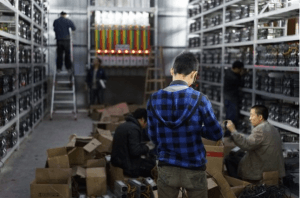Western curiosity about Bitcoin in China remains high, but access to information is usually quite limited.

 As a consequence, there are a few tropes about Chinese Bitcoin activity that tend to pop up in every conversation. There are huge factory-like mining farms in the countryside. The government discourages Bitcoin use, limiting its utility to anyone other than gamblers and speculators. Chinese people are using Bitcoin to get their money out of the country.
As a consequence, there are a few tropes about Chinese Bitcoin activity that tend to pop up in every conversation. There are huge factory-like mining farms in the countryside. The government discourages Bitcoin use, limiting its utility to anyone other than gamblers and speculators. Chinese people are using Bitcoin to get their money out of the country.
Some of the preconceptions are misguided – the government has never prohibited Bitcoin, and cryptocurrency trades represented only a minuscule portion of the $676 billion that left China last year.
Others are more accurate – those massive mining operations do exist in rural areas where electricity is cheap, and exchanges are big businesses that aim to attract traders with a love for double-figure leverage.
A Bitcoin Bank Account Instead?
For this reason, Chinese startup HaoBTC‘s site stands out as trying to offer something more original. For starters, the company’s minimalist interface looks more bank-like than a casino, and it offers interest payments on BTC deposits.
Apart from its primary function as a bitcoin wallet, there’s also a “finance” option for longer-term interest-bearing deposits, a multi-sig vault storage service, a simple brokerage and direct linking to fiat accounts at 11 Chinese banks.
 HaoBTC does also operate, however, a large-scale Bitcoin mine of its own – which is how it pays the aforementioned interest. The company invests its customer deposits in the mine, which sits next to a hydro-electric plant atop a dam.
HaoBTC does also operate, however, a large-scale Bitcoin mine of its own – which is how it pays the aforementioned interest. The company invests its customer deposits in the mine, which sits next to a hydro-electric plant atop a dam.
While other Bitcoin exchanges in China and elsewhere sometimes offer interest, the money usually comes from loaning the bitcoins to margin traders. HaoBTC says in its FAQ that over 400 BTC in interest has been paid – at 3% p.a. to ordinary wallets and 12-15.58% to “finance” accounts.
HaoBTC has a full English interface, though only China residents can link bank accounts for fiat deposits and withdrawals. Customers without Chinese bank accounts are limited to bitcoin-only services, though they can still earn interest.
Customers Don’t Always Know What They Want
When it first opened, HaoBTC offered a standard on-chain bitcoin wallet called “OpenBlock,” but soon shut it down after business failed to take off.
Chief Marketing Officer Eric Mu explained to Bitcoin.com the reasons, and the company’s rationale for pivoting to something more bank account-like and familiar:
“After the first idea failed to take off, we reflected on what went wrong – the conclusion is that we should focus more on what people really want instead of what they say they do.”
What most Bitcoiners always say they want, Mu added, is full control of their coins with on-chain wallets and retention of their own private keys. In fact, though, many see Bitcoin as an investment, like startup shares, and are willing to take certain risks if there’s a reward.
So by design, HaoBTC does function more like a bank, putting its customers’ money into an investment that (hopefully) keeps growing in value. It also aims for more transparency than other Chinese Bitcoin companies have had in the past, explaining the nature of Bitcoin mining, and the risks of investing and speculating on Bitcoin price.
Mining-Based Interest and Fractional-Reserves
HaoBTC deriving its interest payments from a Bitcoin mining operation could raise some eyebrows, but in reality the Bitcoin economy does not present the wide range of investment choices that traditional financial services have.
Mu continued:
“It is not hard to understand that the larger you are, the more ways you have in terms of cost cut – those who can afford advance payment get discount when buying hardware; they also get cheaper electricity because they hold more leverage on negotiation table. So we as miners are incentivized to increase our scale, naturally, this requires capital.”
Raising capital from banks for Bitcoin ventures was not an option in China, he said, and CEO Wu Gang used to borrow money from friends to fund growth. Paying higher interest to HaoBTC’s depositors instead is actually cheaper than these private loans.
Mu also notes that, like banks, HaoBTC operates on a fractional reserve system – because funds need to be invested in growing the mining operation. The company does not wish to hide that fact from its customers, he added, which is part of its transparency ethos.
Where is Bitcoin Actually Going in China?
Like elsewhere, demand for Bitcoin waxes and wanes in China, Mu said. It’s important to be wary of over-generalizing both the cryptocurrency landscape and Chinese attitudes, as most reports tend to be anecdotal.
While anecdotal itself, Mu’s stories from HaoBTC’s Bitcoin mine in remote Sichuan province suggested a curiosity among the public.
“Some locals there expressed curiosity but they were also doubtful. Probably just like I was three years ago when I first learned about Bitcoin, they had many questions: Is it legal? Is it a Ponzi scheme? Is it secure to store? How can some numbers on computer screen be useful?”
After he returned home to Beijing, Mu received messages from the same people asking how to buy bitcoins.
HaoBTC’s support desk noted that several of its customers were older, or “definitely not tech-savvy.” Their inquiries were about setting up Google Authenticator, the possibility of reversing Bitcoin transactions sent to wrong addresses, and wanting to acquire bitcoins to participate in questionable investment schemes like multi-level marketing (MMM).
As for the future, HaoBTC is in the process of introducing a full-featured Bitcoin exchange, but is also monitoring the market closely to see what the “next big thing in the BTC space” might be.
Bitcoin in China is probably more similar to the rest of the world than people think. Everyone faces the same uncertainty, the same risks, and would happily jump at the same opportunities.
Much of what we think we know about Bitcoin in China is true: factory-sized mines, speculation and gambling, and government suspicion are all present. But the time is also coming where we look beyond those few cliches and notice new ideas evolving.
Given the lack of communication between China and the rest of the world, both in language and access to social media, it’s possible the rest of the Bitcoin world may have something to gain by observing what industry participants are doing, and see if they might work in other countries as well.
